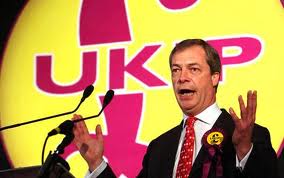The UK Independence Party has stunned the political pundits in the old Dart with its sweeping success in municipal elections in the UK, where it secured around 25 per cent of the vote.
It’s not the first time that a political party has come from seemingly nowhere to seize the imagination, and a large slice of the vote, from a disenchanted electorate –think of the Tea Party in the US, the Five Star Movement of Beppe Grillio in Italy, and other mostly right wing parties scattered through Europe.
UKIP, like many of the others, received the sort of mocking disdain from the mainstream media that has greeted Clive Palmer’s resurrection of the United Australia Party here. UKIP did, after all, feature one Lord Christopher Monckton as its energy spokesman and the head of its Scottish division. Palmer would gladly adopt Monckton’s policies so he can dig up his coal reserves unhindered by climate policy.
The popularity of such parties might be explained by the fact that modern media has trained their readers to consumer news and politics in uncomplicated sound-bites, and now want their policy platforms to be delivered in the same way. It’s worked marvellously for Tony Abbott. The Australian Opposition leader popularity is based around three-word homilies such as “Stop the boats” and “axe the tax”. Never mind the detail – these policies bear little scrutiny and are impossible or impractical to implement: In sound-bite politics, no-one cares.
This is the greatest danger for those seeking to push through climate change and clean energy policies, which are dependent on careful thought and analysis. It’s one thing for someone to consider future electricity bills when considering an energy efficient fridge or some other home appliance. When such thinking is applied to the economy as a whole, it appears all too hard.
As even The Economist noted this week, the world’s financial markets and the investors of trillions of dollars of pension funds – your money and mine – are either making a massive bet that governments won’t act on climate change, or – not for the first time – are simply mis-pricing risk. Fossil fuel companies are counting on the ability to dig up the reserves that support their market valuations. The likes of Palmer and Gina Rinehart are hoping to influence government policy; although in the case of Palmer, it seems he has an ambition to set government policy.
UKIP’s major policy positions are to quit Europe, stop immigration and lower taxes. It is sceptical about the existence of man-made climate change and would scrap all subsidies for renewable energy. According to the BBC, it would also cancel all wind farm developments. Instead, it backs the expansion of shale gas extraction, or fracking, and a mass program of nuclear power stations. The irony of the policy is that subsidies for nuclear would be more expensive, and last longer, than any subsidy for renewable energy.
UKIP’s stance is certainly a dead-ringer for WA Energy Minister’s Mike Nahan’s position, as we outlined here when wondering if Renewables were doomed for failure in Australia.
Who’s to say if Palmer’s UAP will storm the polls in the same that UKIP has in the UK. Palmer is folksy enough in the muddled tradition of Joe Bjelke Peterson and Barnaby Joyce. But it’s not so much in the possible influence of the UAP where the danger lies, it’s within the Coalition’s own ranks.
It shouldn’t be forgotten that Abbott was delivered to the top job in the Coalition – and a likely prime ministership – by a highly conservative rump of the Coalition that ended bipartisan support on climate change policies. It was led by senior politicians, such as Nick Minchin, who didn’t and don’t accept climate change science. Many still remain in the party.
Even more dangerously, bipartisan support is now fracturing around renewables, despite the fact that the Australian Energy Market Operator has found that 100 per cent renewables is emminently achievable, and not so costly, and that other studies such as Bloomberg New Energy Finance suggests that wind, and soon solar, are cheaper to build than new coal and gas fired generation – all of which needs to be replaced in the coming decades.
Despite this, all the state-based coalition governments remain married to the policy altar that deems that renewables are costly and useless, and don’t reduce emissions, and they want the renewable energy target killed or neutered. Many of its new recruits – such Nahan, the Nationals’ Angry Anderson, the Liberals Angus Taylor and Zed Seselja, and the Canberra based would fit comfortably within the UKIP platform. As would many of the incumbents – Joyce, Corey Bernardi, Eric Abetz, Andrew Robb, Simon Birmingham, Michaelia Cash, Alby Shultz, Bill Heffernan, Ian Macdonald, and a host of others.
John Howard had just as many arch-conservatives in his own party, but he had the strength of leadership to keep the factions under control. The importance of this should not be underestimated. Even Labor’s right factions would have fought hard against progressive climate change and energy policies if they hadn’t been effectively neutered by the coalition with the Greens and the country independents.
The question is whether Abbott has the authority to keep these Tea Party and UKIP style politics under control, or even if he wants to. He owes a debt to those who thrust him into power in the first place, and has never convincingly laid his “climate change is crap” remark to rest. He may just gladly go along with those that want to extend those policies to curb renewables. Has anyone heard a Coalition politician say they shouldn’t?










